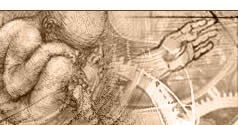 |
 |
 |
 |
 |
 |
 |
 |
|
 |
 |
 |
95 Love, joy, suffering and sorrow
|
| Menu | back |
It is hard to reconcile the existence of the phenomenon of love with the theory of evolution. Aside from sexual love, it is an indescribable, purely spiritual component that contradicts the naturalistic world principle. Could life really have arisen from inanimate, insentient matter? If that is the case, love, joy, suffering, and sorrow are nothing more than immensely complicated naturalistic mechanisms that would be more of a hindrance than a help in the pitiless struggle for survival. Could it have been that on the beginning of life not pure chance could have ruled but in fact the love of an intelligent designer?
In the narrower sense, love designates the deepest sense of attachment that a person can have for another one. Love is a feeling, or perhaps even more an inner attitude, of positive, sincere and deep devotion to a person that goes beyond the mere purpose or usefulness of an interpersonal relationship and is normally expressed as active affection for the loved one.
Ancient Greek differentiates between three kinds of love:
|
| - |
Eros
|
is sensual, erotic love, the desire of the loved one, the wish to be loved, and passion.
|
| - |
Philia
|
is the term for love of family and friends, mutual love, mutual recognition and mutual understanding.
|
| - |
Agape
|
is selfless, helping love, the love of a father or mother for their child, brotherly love, love of ones enemy, love that looks to the well-being of the beloved. It is also known as the love of God (1).
| |
In evolution, relationships are characterized mainly by egoisms, whereas agape and philia look first to the well-being of the other person. Even love based on Eros is controversial in evolutionist circles. Quite a number of proponents of the theory of evolution make reference to the many unisexual life forms that require no Eros-based love at all. But why do these forms exist? To ensure the survival of the fittest individuals? Not a very romantic notion
Conclusion:
The age of the Earth and the universe can be investigated using scientific methods, as can the descent of species and the structure of our ecosystem. Such investigation must seriously call into question the models offered by the evolution, primordial soup, and big bang theories. At any rate, no one will be able to prove by scientific methods that a loving and caring creator embraces all of life and loves you personally from the bottom of His heart, a creator who shares your joys, sufferings and sorrows and who would like to take you back into His bosom when your physical heart has ceased to beat.
Imagine a young man in love who would like to prove to his girlfriend that he loves her. Will he try to do this by means of logical arguments and scientific methods? Would a love with a purely logical essence be worthy of the name love at all? Nor could it be Gods plan to give us rational answers to all our questions. For love is not grasped with the rational mind, but rather with the heart. God is love. If you believe that, you already know a great deal more than science (no matter how sophisticated) will ever assess.
Final declaration | Menu |
back
|
Reference:
|
| (1) |
The Bible, 1 Corinthians 13. | |
| |
Comment this Site!
|
 |
 |
 |
 |
|

